Pew Research Center conducted this study to understand Americans’ views on immigration and immigration policy prior to the 2024 presidential election.
For this analysis, we surveyed 9,201 adults – including 7,569 registered voters – from Aug. 5 to 11, 2024. Everyone who took part in this survey is a member of the Center’s American Trends Panel (ATP), a group of people recruited through national, random sampling of residential addresses who have agreed to take surveys regularly. This kind of recruitment gives nearly all U.S. adults a chance of selection. Surveys were conducted either online or by telephone with a live interviewer. The survey is weighted to be representative of the U.S. adult population by gender, race, ethnicity, partisan affiliation, education and other factors. Read more about the ATP’s methodology.
Here are the questions used for the report, the topline and its methodology.
Harris supporters are respondents who said they would vote for Kamala Harris, the Democrat, if the 2024 presidential election were held today, or those who said they would not vote for any of the candidates but lean toward Harris. Trump supporters are respondents who said they would vote for Donald Trump, the Republican, if the 2024 presidential election were held today, or those who said they would not vote for any of the candidates but lean toward Trump.
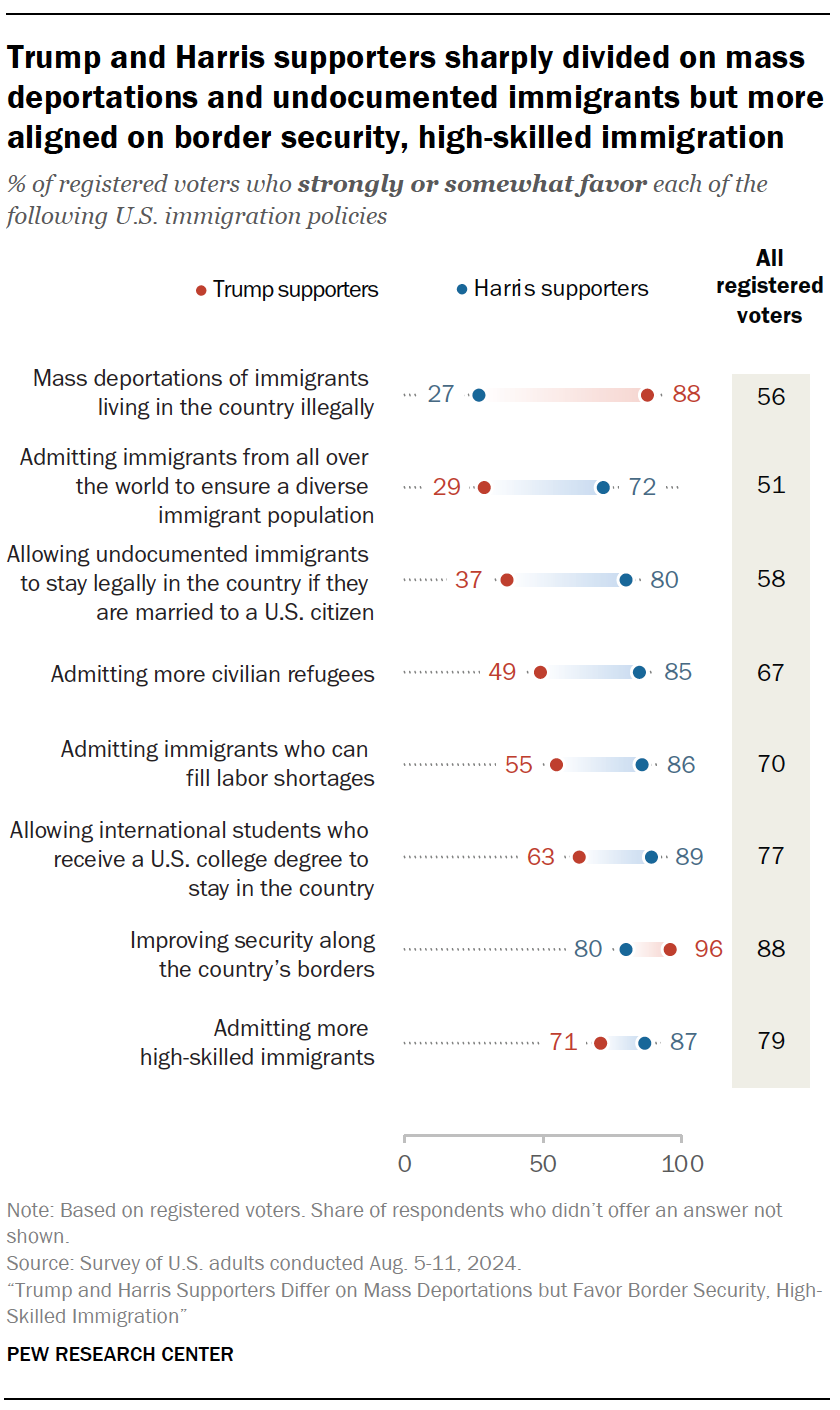
In a presidential race where immigration has become a key and contentious issue, a Pew Research Center survey shows wide differences and common ground on immigration policy among registered voters who support Donald Trump and Kamala Harris.
The candidates have taken sometimes sharply different positions on immigration issues that divide their supporters:
- Nearly nine-in-ten Trump supporters (88%) favor mass deportations of immigrants living in the country illegally. In contrast, only 27% of Harris supporters favor mass deportations while 72% oppose.
- More than a third of Trump supporters (37%) favor allowing undocumented immigrants to live and work in the U.S. if they are married to an American citizen, compared with 80% of Harris supporters who say the same.
- About half of Trump supporters (49%) support admitting more civilian refugees who are escaping war or violence, but a majority of Harris supporters (85%) say the same.
On other immigration issues, Trump and Harris supporters share more common ground:
- Improving border security is supported by large majorities of both Trump supporters (96%) and Harris supporters (80%).
- Admitting more high-skilled immigrants is favored by 71% of Trump supporters and 87% of Harris supporters.
These findings come from a bilingual, nationally representative survey of 9,201 adults – including 7,569 registered voters – conducted Aug. 5-11, 2024, ahead of the Democratic National Convention and about a month before the Sept. 10 presidential debate.
The U.S. immigrant population has grown sharply over the decades, from 9.6 million in 1970 to 31.1 million in 2000 and almost 48 million in 2023. These totals account for immigrants in the country both legally and illegally.
Immigrants make up about 14.3% of the nation’s population, a near-record high. They are dispersed across all states and metro areas. And nearly three-quarters of registered voters say they know someone who was born outside of the United States, according to the survey.
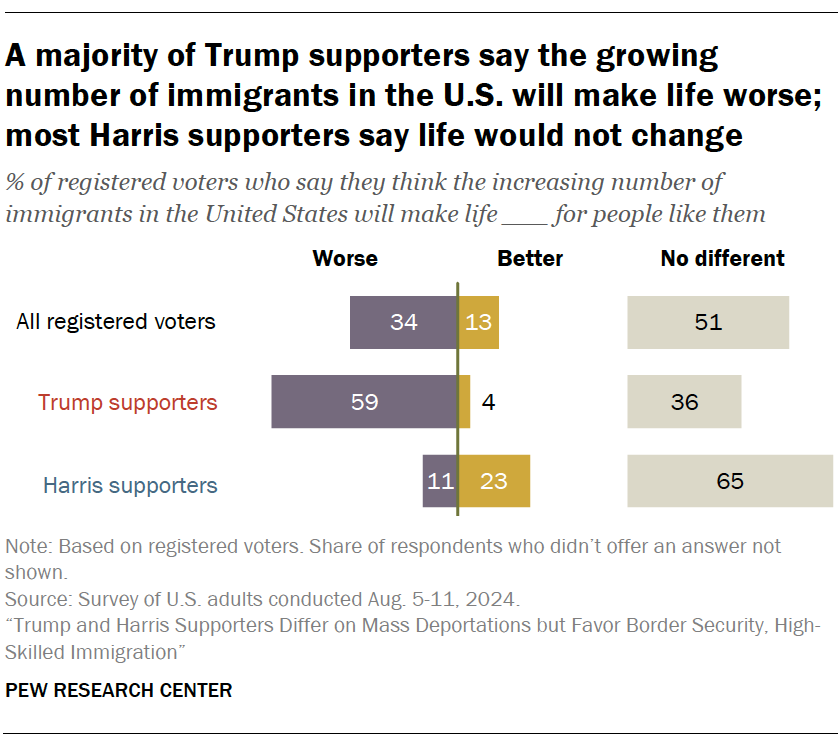
Trump supporters have a more negative view than Harris supporters on the impact of immigrants on their lives. A majority of Trump supporters (59%) say that the increasing number of immigrants will make things worse for people like them. But a majority of Harris supporters (65%) say that the increasing number of immigrants will make no difference in their lives, with only 11% saying it will make life worse for people like them.
Trump supporters have a mixed view about the impact of legal immigration on the country. A majority say immigrants living in the country legally either make the economy better (31%) or don’t have much of an effect on it (38%), while 29% say these immigrants make the economy worse. By contrast, a clear majority of Harris supporters (62%) say immigrants living in the U.S. legally make the economy better.
Trump supporters have a much more negative view of the impact of illegal immigration. An overwhelming majority of Trump supporters (92%) say immigrants living in the country illegally make crime worse, compared with 37% of Harris supporters.
Notably, American voters have become less likely than in recent years to say undocumented immigrants should be allowed to stay in the country. About six-in-ten U.S. registered voters (59%) in the new survey say undocumented immigrants should be allowed to stay in the country legally if certain requirements are met, down from 77% who said the same in 2017. Most Harris supporters (87%) say that there should be a way for undocumented immigrants to stay in the country legally, compared with only a third of Trump supporters (33%).
In the 2024 presidential race, Trump supporters place far more importance on immigration than Harris supporters. For Trump supporters, 82% say immigration is very important to their vote in the 2024 presidential election, trailing only the economy in importance, according to a Center survey conducted in late August to early September. By contrast, just 39% of Harris supporters say the issue of immigration is very important to their presidential vote this year, behind all other issues asked about in the survey, including health care, Supreme Court appointments, the economy, abortion, gun policy and climate change.
Immigration to U.S. has rebounded from pandemic-era lows
Legal immigration to the U.S. has started to increase after a steep decline during the COVID-19 outbreak, according to Center analysis of data from the Department of Homeland Security. In 2023, about 1.1 million immigrants became lawful permanent residents of the U.S., a return to pre-pandemic levels.
In addition, a record number of immigrants crossed the U.S.-Mexico border without authorization at the end of 2023, though these flows have since dropped sharply. Both Republicans and Democrats have been critical of the way the government has handled the situation at the U.S. Mexico border.
Overall, confidence in the Biden administration’s handling of immigration has declined among both Republicans and Democrats. In July, 35% of American voters had confidence in Joe Biden to make wise decisions about immigration. By September, more voters had confidence in Trump (52%) on this issue than in Harris (45%) – though confidence in Harris is higher than it was in Biden.
Views on government control over illegal and legal immigration
In the new survey, two-thirds of Trump supporters (66%) say the U.S. government has little or no control over immigrants entering the country illegally, while fewer than half (40%) of Harris supporters say the same.
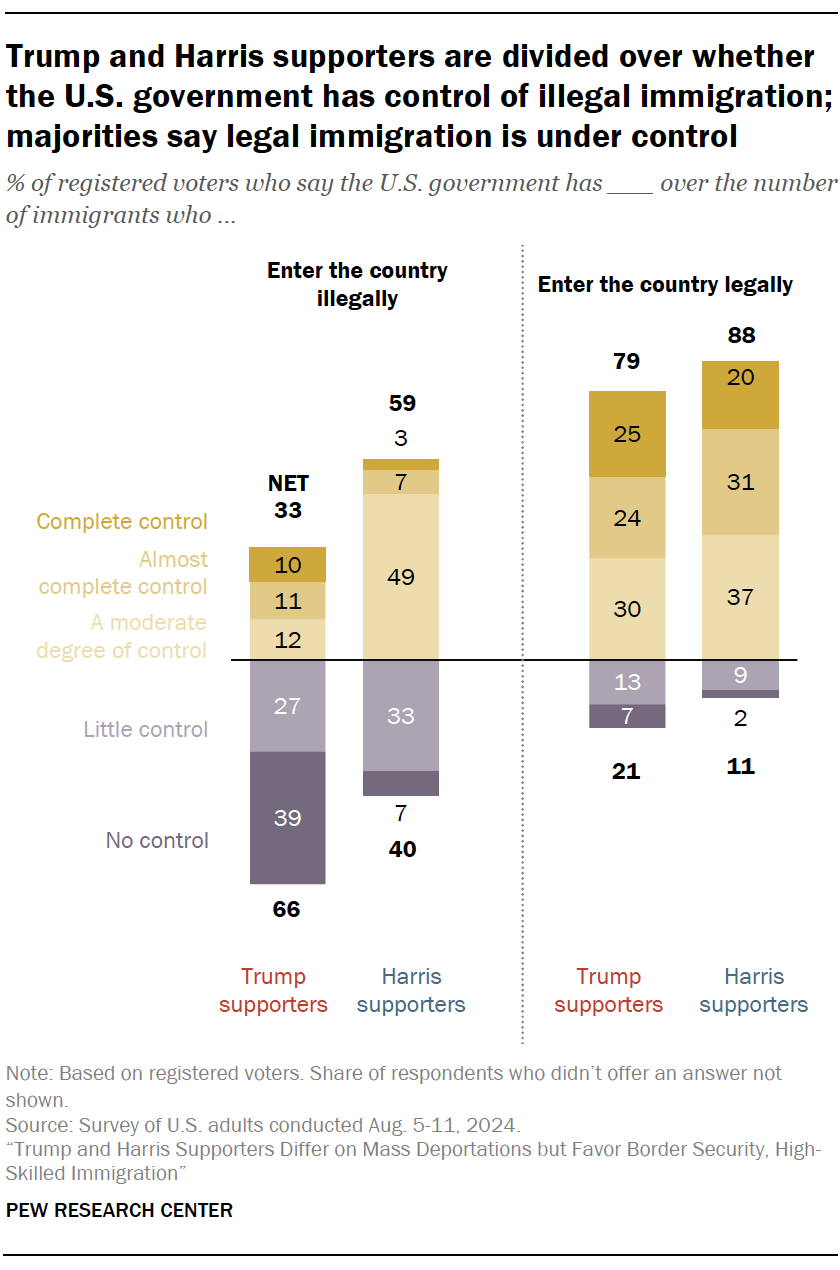
By contrast, about half of both Trump (49%) and Harris (51%) supporters say the federal government has complete or almost complete control over immigrants entering country legally. Somewhat similar shares of Trump and Harris supporters (30% and 37%, respectively) say the government has a moderate degree of control over legal immigration.
Overall, 33% of Trump supporters say the government has at least a moderate degree of control over legal immigration, compared with 59% of Harris supporters.
Despite agreement over the government’s control of legal immigration, about three-quarters of both Trump (74%) and Harris (76%) supporters say the U.S. immigration system needs major changes or needs to be completely rebuilt.
Views on the level of illegal and legal immigration into the U.S.
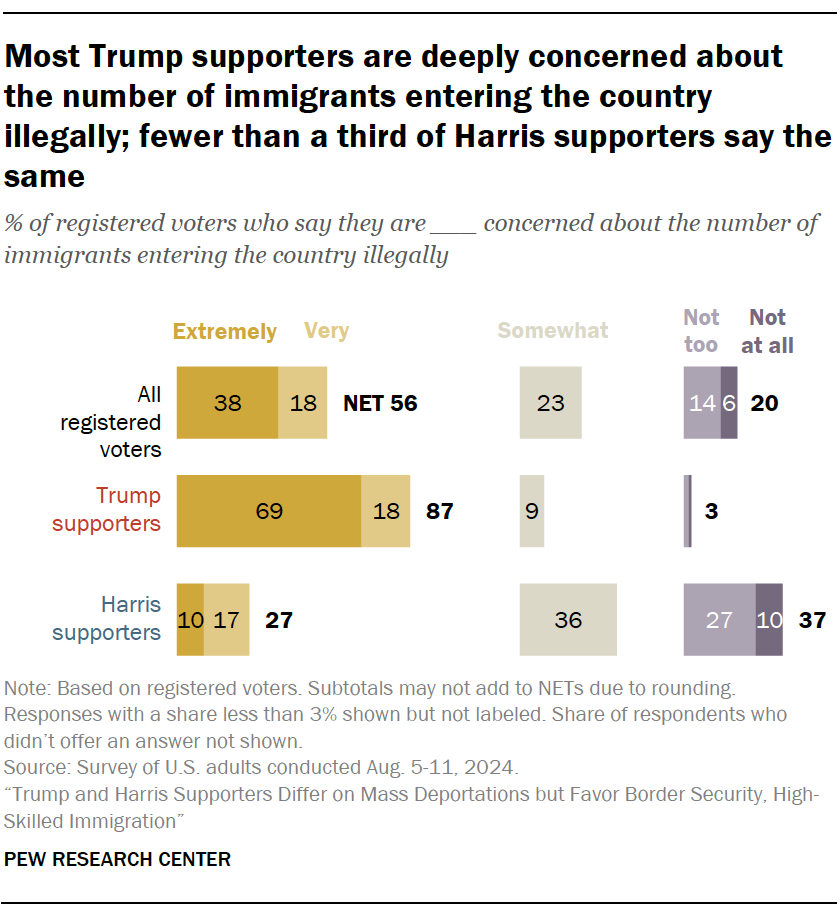
Trump supporters express far higher levels of concern than Harris supporters about illegal immigration. Most Trump supporters (87%) say they are very or extremely concerned about the number of immigrants entering the country illegally, while about a quarter of Harris supporters (27%) say the same.
Just over a third of Harris supporters say they are somewhat concerned (36%) about this, while a similar share (37%) say they are not concerned about the number of immigrants entering the country illegally.
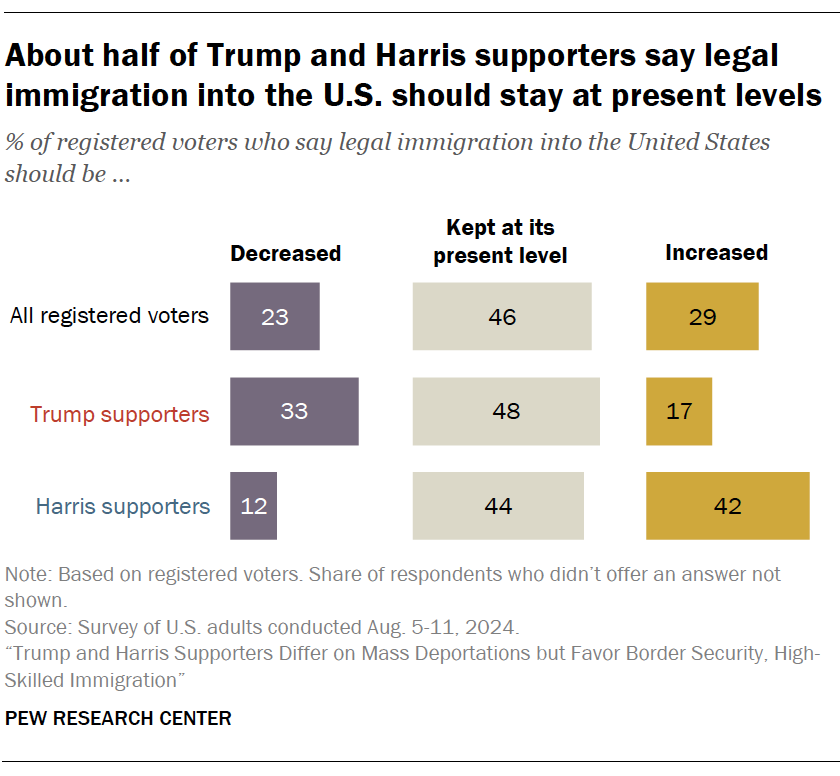
Trump and Harris supporters are less divided on the levels of legal immigration into the U.S. Nearly half of both Trump and Harris supporters say legal immigration should be kept at its present level – 48% and 44%, respectively.
But support differs when it comes to changing the level of legal immigration into the U.S. A third of Trump supporters (33%) favor decreased legal immigration, and smaller shares (17%) say it should be increased. Meanwhile, about four-in-ten Harris supporters (42%) favor increased legal immigration, with smaller shares favoring decreased immigration levels.
How do registered voters view the impact of immigrants on U.S. society?
About three-quarters of U.S. immigrants are here legally, and about a quarter are unauthorized immigrants.
Registered voters draw a distinction between immigrants living in the country illegally and legally when it comes to the impact immigrants have on society. For example, a majority of registered voters say that immigrants living in the country illegally have negative impacts on public resources (70%) and on crime (64%). By contrast, nearly half of voters say that immigrants living in the country legally have a positive impact on U.S. economy.
The impact of immigrants living in the country illegally
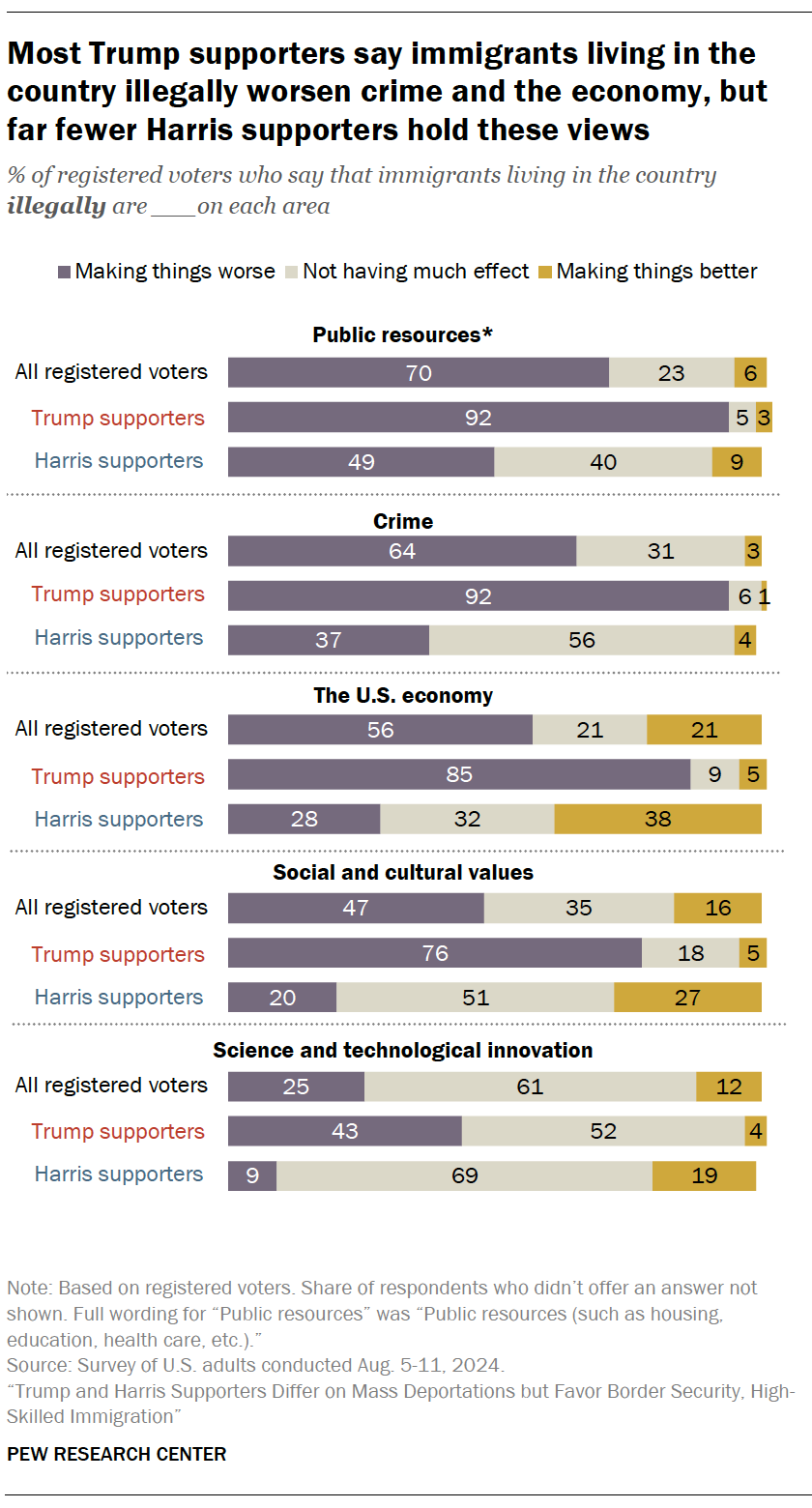
Majorities of Trump supporters say immigrants living in the country illegally make things worse when it comes to crime (92%), public resources like housing, education or health care (92%), the U.S. economy (85%) and social and cultural values (76%).
Harris supporters have a mix of positive and negative views about the impact of immigrants living in the country illegally.
- 56% of Harris supporters say immigrants living in the country illegally don’t have much effect on crime, with 37% saying they make things worse.
- 38% of Harris supporters say immigrants in the country illegally make things better for the U.S. economy, while 32% say they don’t have much of an effect and 28% say they make things worse.
- 49% say immigrants living in the country illegally make things worse when it comes to public resources, while 40% say they don’t have much an effect.
Should immigrants living in the country illegally be eligible for public assistance?
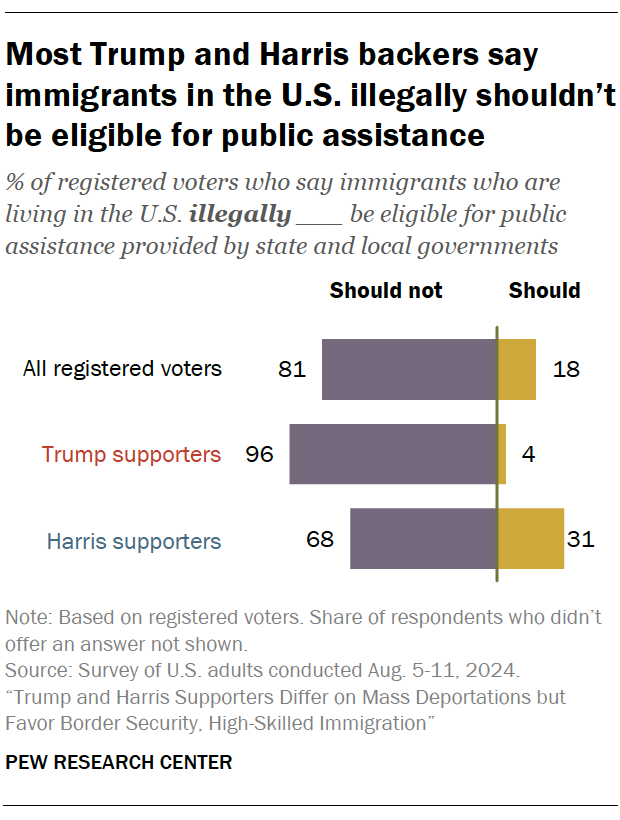
Unauthorized immigrants are ineligible for most federally funded public benefits. And immigrant eligibility for public assistance differs across state and local levels. For example, California offers financial aid to unauthorized immigrant students, while Minnesota will soon allow unauthorized immigrants to access health insurance coverage offered to low-income residents.
Survey findings show that a majority (81%) of voters say immigrants who are living in the U.S. illegally should not be eligible for public assistance.
Nearly all Trump supporters (96%) say immigrants living in the country illegally should not be eligible for public assistance from state and local governments. A majority of Harris supporters (68%) say the same, while nearly a third (31%) say immigrants living in the country illegally should be eligible for public assistance.
The impact of immigrants living in the country legally
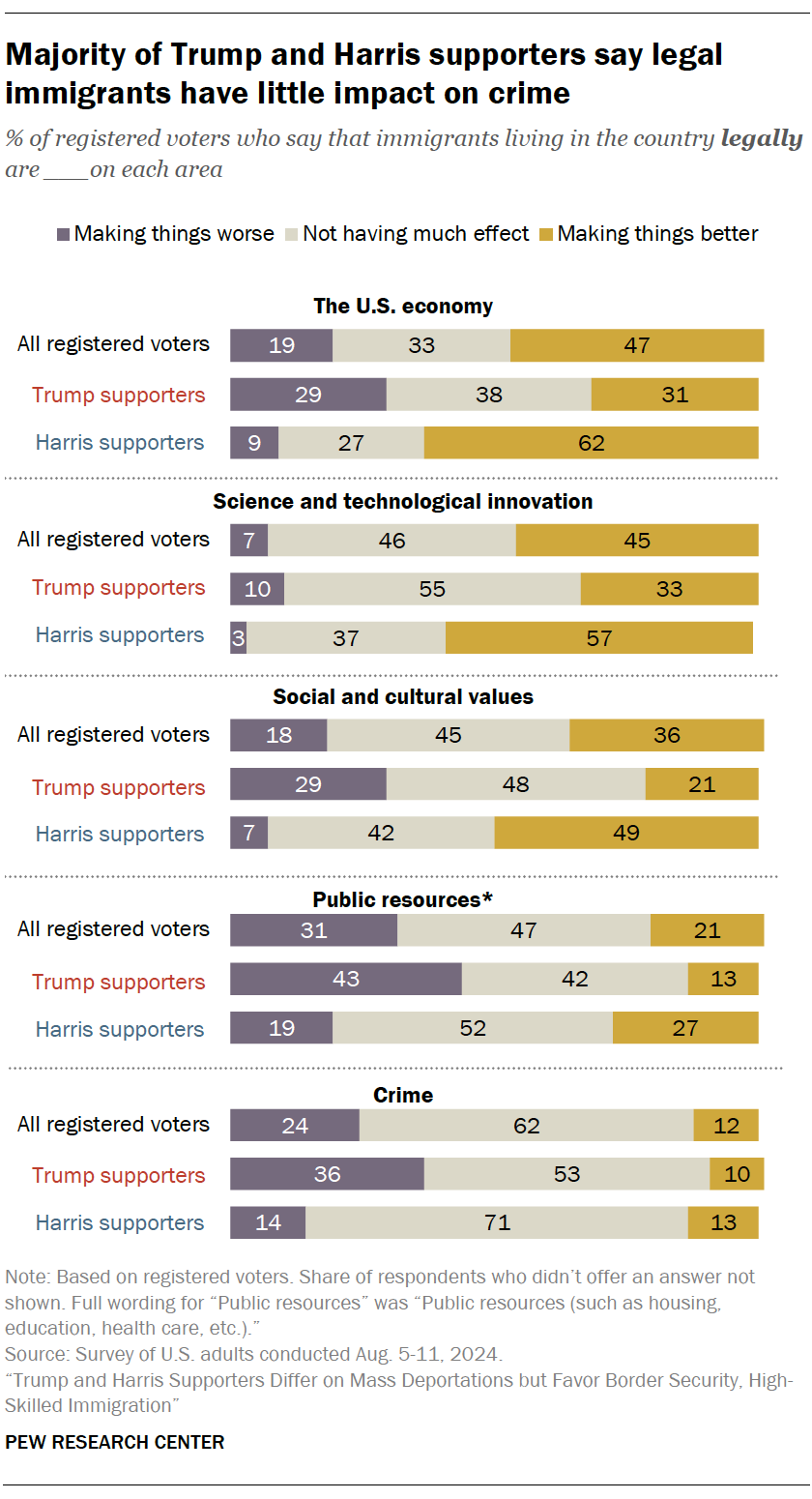
Harris supporters are more likely than Trump supporters to say immigrants living in the country legally improve the U.S. economy, science and technological innovation, and social and cultural values.
- 62% of Harris supporters say immigrants living in the country legally make things better for the U.S. economy, compared with 31% of Trump supporters.
- 57% of Harris supporters say immigrants living in the country legally make things better for science and technological innovation, compared with 33% of Trump supporters.
Notably, a majority of registered voters (62%) say immigrants living in the country legally do not have much effect on crime, with 71% of Harris supporters and 53% of Trump supporters saying so. Still, 36% of Trump supporters say legal immigrants make crime worse.
Sizable shares of Trump supporters (42%) and Harris supporters (52%) say immigrants living in the country legally do not have much effect on public resources such as housing, education or health care.
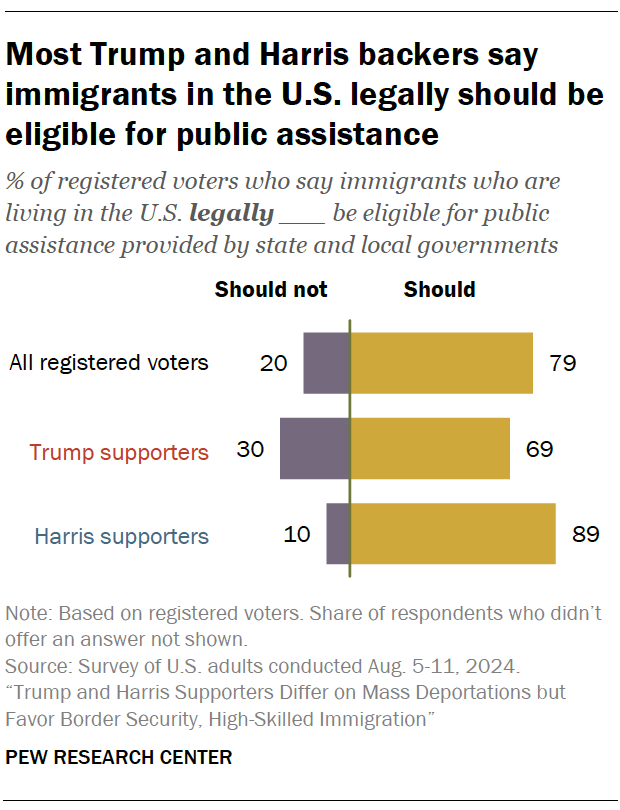
Should immigrants living in the country legally be eligible for public assistance?
Notably, majorities of both Trump (69%) and Harris (89%) supporters say legal immigrants should be eligible for public assistance by state and local governments, reflecting their markedly different views on immigrants living in the country legally and those in the country illegally.




